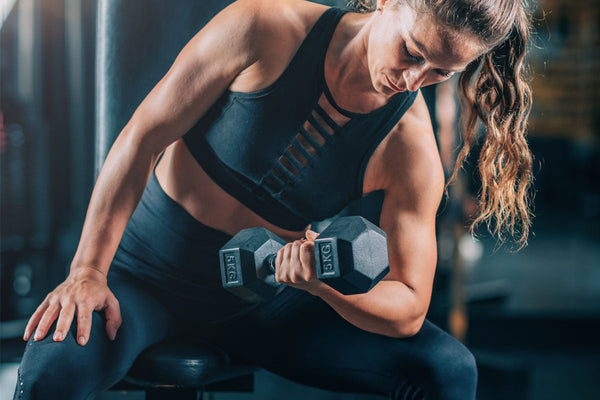When individuals get serious about their health and fitness, one of the most common questions is ”should I lose weight before building muscle?”
As with many things in fitness (and life, in general), it depends
The factors that can impact your decision include your current body composition, your goals, and your timeline. Today, we will offer some insight to help you decide for yourself if you should lose weight before building muscle.
Losing Weight Before Building Muscle
Generally speaking, if you are a female with more than 25% body fat or a male with greater than 15% body fat, then you want to prioritize fat loss over muscle gain.
The reasons for this are many.
For starters, carrying around excess body fat adversely affects your metabolism and performance in the gym. High amounts of body fat also reduce insulin sensitivity, nutrient partitioning, and protein synthesis (which can limit muscle building potential).[1]
Perhaps the most important reason to prioritize fat loss if you are overweight is that high body fat levels contribute to hypertension (high blood pressure, hormone disruption, sleep apnea, and arthritis.[2]
As such, if you are very overweight, then stripping off that excess body fat is critical.
Now, this doesn't mean you wont build some muscle and strength, you just wonӮt be doing it at the most optimal rate.
When dieting for fat loss, you will still perform resistance training multiple times per week (ideally 3-5 times per week, as your schedule allows) and consume enough protein (~1 gram per pound of bodyweight). This helps your body maintain its lean muscle mass and shed body fat while in a calorie deficit.
Once you hit your goal body fat levels, you will realize you have more energy, less stress on your joints, and your metabolism will be ready to use the extra calories you are going to feed it to build muscle efficiently.
Building Muscle Before Losing Weight
On the flip side, if you are a female at or below 20% body fat or a male at or below 10% body fat, then you will want to prioritize building muscle over losing fat. Having a relatively low level of body fat improves your ability to build more muscle and gain less fat due to greater insulin sensitivity, more stable estrogen levels, and higher testosterone levels.[3]
Additionally, if you are someone at a healthy body weight, but have relatively little muscle mass, then you want to focus on building muscle and gaining strength.
In addition to improving your aesthetics, building muscle will boost your metabolism, so you will burn more calories during the day, even at rest!
Can You Lose Fat and Gain Muscle at the Same Time?
Yes, it is possible.
However, it may not be the best choice if you have been training consistently for some time (>1 year).
Losing fat and gaining muscle at the same time (recomping) is most effective in those individuals who are new to training or are coming back from a very long gym absence. When the body is in a a deconditioned state it will be highly receptive to any new form of training, which is good for building muscle in the midst of a calorie deficit.
Unfortunately, for those of us who have been hitting the gym consistently, recomping isn't as efficient. It is a long, slow, and arduous process that can feel like you are spinning your wheels most of the time.
You are not really gaining muscle or losing fat at the most efficient rate, which can lead you to feel like you are not making any significant progress at all.
This is why losing fat and building muscle at the same time is better suited to beginners or those who haven't trained for a long time.
Important Takeaways
The decision whether to lose fat before building muscle is a personal choice and can be influenced by many factors.
Regardless of which path you take, here are some important tips to keep in mind:
- Calorie intake: you need to tailor your calorie intake to your goals. For fat loss, you need to be in a calorie deficit. For muscle building, you need to be in a calorie surplus. If you are not sure how many calories to eat for your goal, the 1UP Fitness App can help! Within the app, we provide customized nutrition plans (and training programs) for FREE!
- Adequate protein intake: regardless of fat loss or muscle building, consuming enough protein is critical. Aim for ~1 gram per pound of bodyweight per day to give your body enough ”raw materials” to repair and build muscle. We offer a variety of high-quality, delicious-tasting protein powders to help you meet your daily needs, including whey protein, clear protein, and vegan protein.
- Carbohydrates have their place: This is especially important for losing fat. Carbohydrates are often demonized as ”°promoting fat gain”±, but the reality is that carbohydrates can help you to train harder in the gym and recover faster (which benefits fat loss and muscle growth!). Also, certain carbohydrates (fruits, veggies, legumes, and whole grains) include essential vitamins, minerals, antioxidants and fiber.
- Resistance training: progressive resistance training is essential to maintaining and building muscle. Cardio has its place but for gaining strength, resistance training is king!
- Track progress: Fat loss and muscle gain isnӮt just about the number on the bathroom scale. Take pictures and measurements each week as well. This way you will be able to see the physical changes that happen over the weeks during your transformation challenge.
References
- Katsanos, C.S. and Mandarino, L.J. (2011), Protein Metabolism in Human Obesity: A Shift in Focus From Whole©\Body to Skeletal Muscle. Obesity, 19: 469-475. doi:10.1038/oby.2010.290
- Singla P, Bardoloi A, Parkash AA. Metabolic effects of obesity: A review. World J Diabetes. 2010;1(3):76ØC88. doi:10.4239/wjd.v1.i3.76
- Jensen J, Rustad PI, Kolnes AJ, Lai YC. The role of skeletal muscle glycogen breakdown for regulation of insulin sensitivity by exercise. Front Physiol. 2011;2:112. Published 2011 Dec 30. doi:10.3389/fphys.2011.00112






